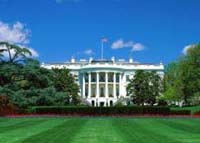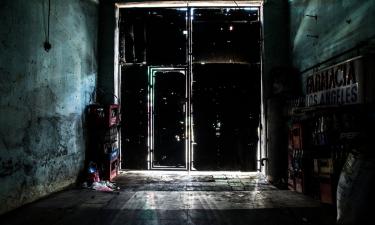Americans vote for change, Democrats win for the first time in 12 years
The Democratic takeover of the House of Representatives presents President George W. Bush with the first serious challenge to his conduct of the war in Iraq and drastically changes the balance of power in Washington.

Angry at Bush and weary of a war in its fourth year, American voters on Tuesday sent a clear call for change to the White House and to Republican lawmakers who have marched loyally in step behind the commander in chief.
To make sure their voices were heard, voters threw Republicans from power in the House for the first time in a dozen years and weakened the Republican Party's grip on the Senate. And Democrats stand ready to influence the nation's agenda and put the brakes on Bush's proposals.
Democratic Congresswoman Nancy Pelosi, in line to become the first female leader, or speaker, of the U.S. House, said Bush's stay-the-course strategy in Iraq must change. "Mr. President, we need a new direction in Iraq," Pelosi said. "Let us work together to find a solution to the war in Iraq."
But it is not at all clear what that solution would be. Some Democrats are demanding troop withdrawals. Others oppose that step. Many Democrats and some Republicans demand the resignation of Defense Secretary Donald Rumsfeld. Bush says he wants him to stay.
"The biggest message coming out of this election is that the Iraq policy of this administration has failed," said Leon Panetta, a onetime Democratic congressman who was Bill Clinton's chief of staff. "The Democrats don't have an answer either." Panetta is a member of a blue-ribbon commission exploring Iraq options.
The Democratic upheaval reversed the Republican revolution launched by Newt Gingrich in 1994. For Bush, it means he will have to compromise with an opposition Congress for the first time or use the veto pen that he's picked up only once.
Democrats and even some Republicans campaigned against Bush's proposals on immigration, Social Security, stem cell research and his willingness to tolerate a deficit-financed government.
Some Republicans think divided government is a prescription for more gridlock in Washington. "This crowd (of Democrats) doesn't want to have any bill signing ceremonies with George Bush," said Ed Rogers, a Republican consultant who worked in the first Bush White House.
Six years into Bush's administration, the election stood as a referendum on his presidency, which has been weakened by high gasoline prices, economic insecurity and the government's sluggish response to Hurricane Katrina. Far more voters said national issues mattered more than local issues in their House vote, and a majority worried that the nation is seriously off on the wrong track.
All around, it was a bad night for the president and his political mastermind, Karl Rove, who shaped an aggressive political strategy that won Bush the governor's office in Texas and then the White House.
Almost three in ten white evangelicals, a key part of the Republican base, voted Democratic. Democrats also won support from key groups that Republicans had raided when they took control in 1994.
The middle class, for example, gave Republicans 54 percent of its votes in 1994. Tuesday the results flipped, with Democrats winning 54 percent of that group.
The Democrats also swept through the suburbs, enjoying a 10-point advantage among suburban women and splitting the suburban male vote with the Republican Party. In 1994, 61 percent of suburban men voted Republican.
In 1994, more than six in 10 white men voted Republican, but the Republicans barely won among white men Tuesday, taking about half of their House vote.
Bush's name was not on any ballot but he framed the election as a yes-or-no decision on his handling of Iraq, now in its fourth year, and the war on terrorism. It was a risky roll of the dice for an unpopular president. Desperate to keep Democrats from power, Bush held about 90 fundraisers over 20 months and collected more than $193 million (Ђ151 million) for the Republicans.
In the end, it was a bleak scorecard for Bush. Exit polls showed about six in 10 voters disapproved of the way he is handling his job. About six in 10 disapproved of the war and two-thirds said Iraq was an important issue and they were more inclined to vote for a Democrat.
Only a third said the war has improved America's long-term security, down from almost half - 46 percent - in the 2004 national exit poll.
Jill Dummett, a 35-year-old Democrat in Florida, voted for Republican Charlie Crist for governor but Democrat Bill Nelson for U.S. Senate. "I didn't really want to have a Republican up there in Washington because of the war in Iraq," she said.
The election came at a particularly bad time for Bush. Americans went to the polls just days after a bloody October ended with 105 American service members killed - the fourth deadliest month since the war began.
Seizing on anxieties after the Sept. 11, 2001, terrorist attacks, Bush and his Republican allies have played the national security card to their advantage in national elections in 2002 and 2004. They tried again this year but it didn't appear to work.
About half of voters in exit polls didn't give either party an advantage in keeping the nation safe. Those who said it was very important tended to split their vote.
While war and corruption hurt the Republicans, history played a part, too.
Since World War II, the party in control of the White House has lost an average 31 House seats and six Senate seats in the second midterm election of a president's tenure in office.
Subscribe to Pravda.Ru Telegram channel, Facebook, RSS!




